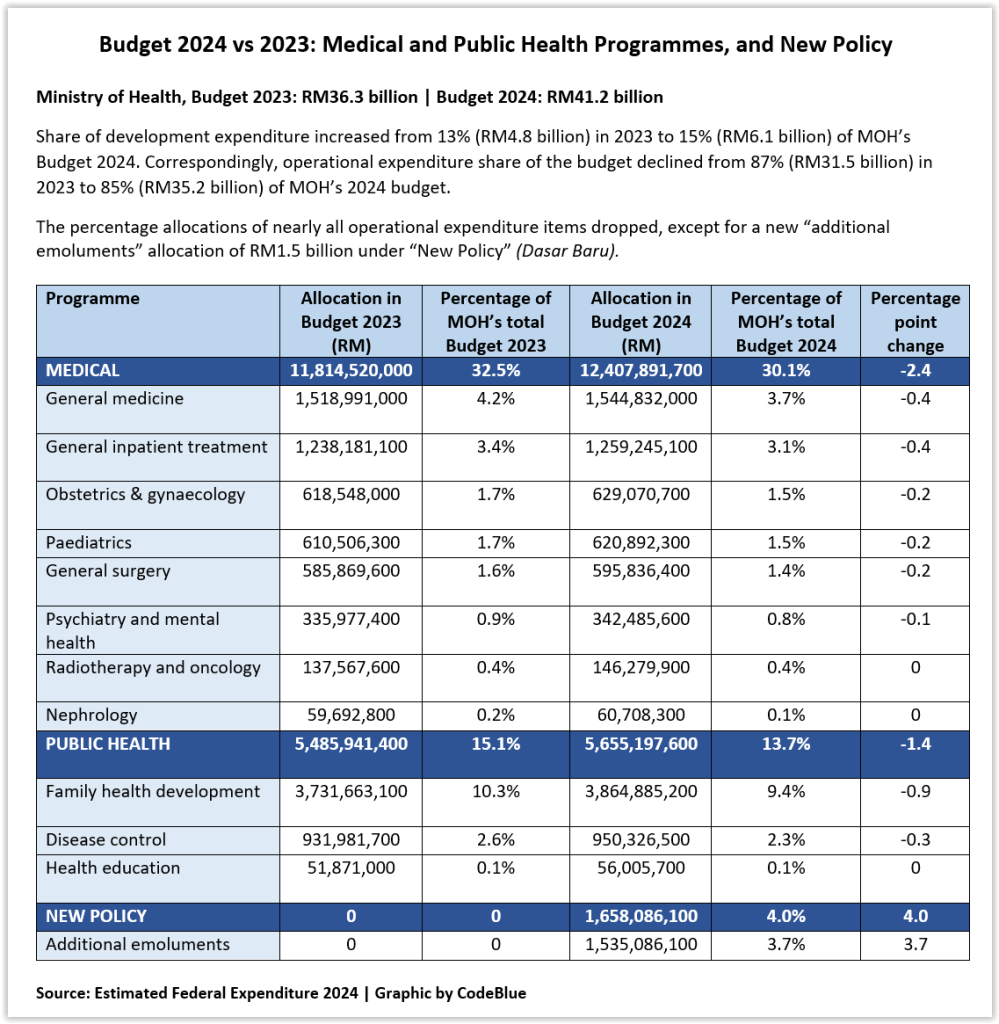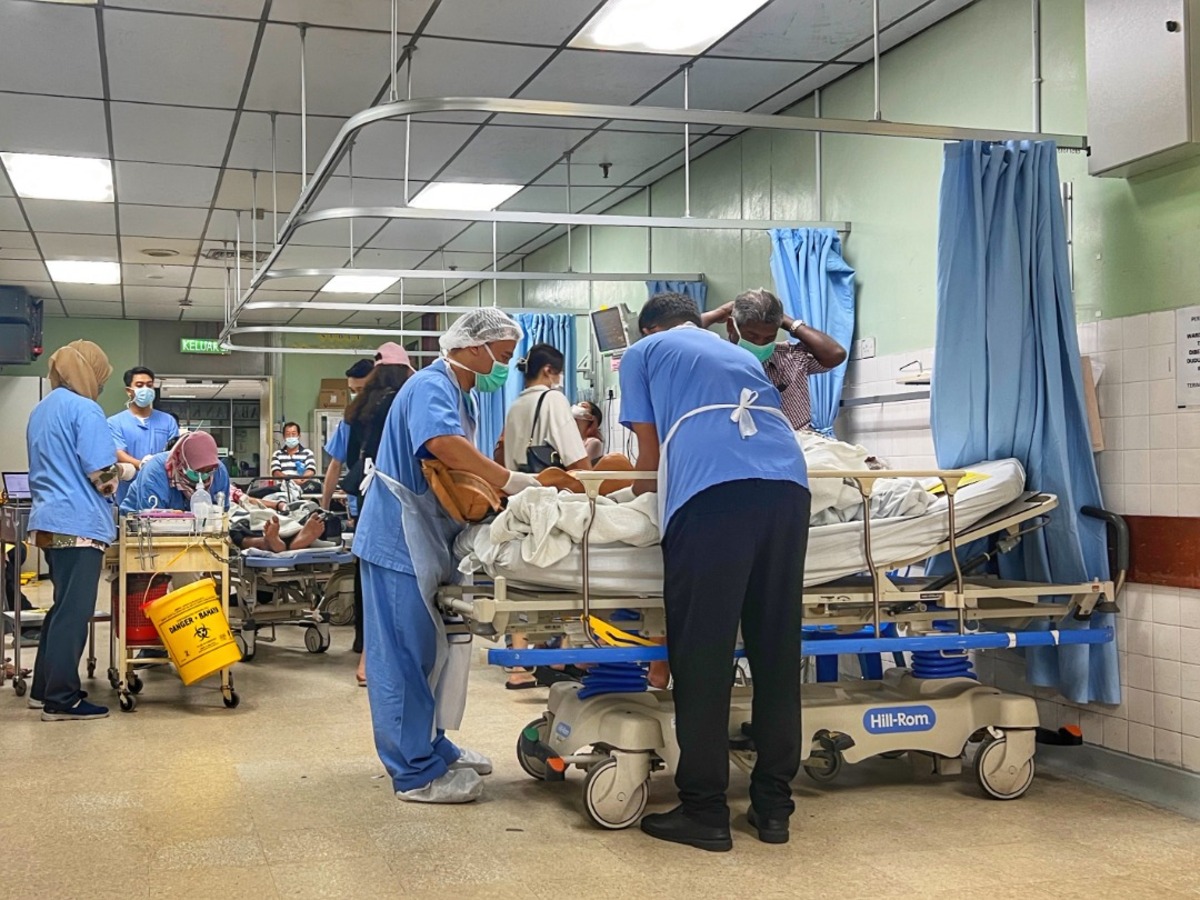KUALA LUMPUR, Oct 16 — Development expenditure expanded to 15 per cent of the Ministry of Health’s (MOH) 2024 budget at RM6.1 billion from 13 per cent (RM4.8 billion) in 2023, even as emoluments remained more than half the budget.
Although all mainline items under operational expenditure in the MOH’s RM41.2 billion budget saw increased allocations in absolute numbers from 2023 – in line with the total 2024 budget’s 13.5 per cent raise of RM4.9 billion – the share of nearly all operational items against the overall budget declined.
The share of the medical programmes’ RM12.4 billion allocation dropped 2.4 percentage points from 32.5 per cent of MOH’s 2023 budget to 30.1 per cent of MOH’s 2024 budget.
Under medical programmes, the share of various disciplines against the ministry’s budget – general inpatient treatment, general medicine, emergency and outpatient treatment, general surgery, obstetrics & gynaecology, paediatrics, pharmacy and supplies, orthopaedics, anaesthesiology and intensive care, diagnostic imaging, pathology, dietetics, and psychiatry and mental health – all dropped between 0.4 and 0.1 percentage points for 2024 when compared to 2023.
The public health allocation of RM5.7 billion similarly dropped by 1.4 percentage points from 15.1 per cent of MOH’s 2023 budget to 13.7 per cent of MOH’s 2024 budget.
Allocations of programmes under public health against the ministry’s budget declined respectively: family health development (0.9 percentage points), disease control (0.3 percentage points), and public health pharmacy and supplies (0.1 percentage points) for 2024, as compared to 2023.
The smaller share of public health for 2024 compared to the 2023 budget comes despite the Ministry of Health (MOH) touting, in the Health White Paper, a transition from curative to preventive care.
However, under the “New Policy” mainline item, the government proposed new programmes related to primary and preventive health, namely the Madani Medical Scheme and Agenda Nasional Malaysia Sihat 2.0, with allocations of RM100 million and RM23 million respectively.
Prime Minister Anwar Ibrahim’s administration also allocated RM24.6 million for the National Centre of Excellence for Mental Health (NCEMH) in Cyberjaya that was launched during Ismail Sabri Yaakob’s government in October last year.
The “New Policy” mainline item was allocated RM1.7 billion in the 2024 budget, most of which went to “additional emoluments” at RM1.5 billion. Bandar Kuching MP Dr Kelvin Yii, who is special advisor to Health Minister Dr Zaliha Mustafa, tweeted that this salary item was likely for extra permanent positions to address contract worker issues.
Under the “Specific Programmes” mainline item, emoluments for contract staff increased marginally by 1.6 per cent (RM41 million) to RM2.64 billion for 2024 from RM2.6 billion for 2023.
About 43 per cent of MOH’s RM6.1 billion development expenditure in the 2024 budget went to PPP/ PFI that was allocated RM2.6 billion. PPP/ PFI likely refers to public-private partnership or private finance initiative.
However, Prime Minister Anwar Ibrahim’s Budget 2024 speech last Friday mentioned that the outsourcing of patients from congested MOH hospitals to military, university, and private hospitals was merely allocated RM200 million.
New development projects were proposed in the MOH’s 2024 budget, like the upgrade of MOH quarters (RM32.2 million), mobile clinics (RM2.3 million), and something called BAKAS (RM15.2 million). BAKAS likely refers to Unit Bekalan dan Kebersihan Alam Sekitar.
Information and communications technology (ICT) was allocated RM327 million for 2024, a huge 242 per cent increase from RM96 million in 2023.
Other development projects allocated more than half a billion ringgit in the 2024 budget were hospital facilities (RM874.9 million), equipment and vehicles (RM651.1 million), and new hospitals (RM590.1 million). Renovations, upgrades, and improvements were allocated RM307 million.
Analysis: Opaque About HR Planning, Wages, Welfare Of Health Workers

Both the Malaysian Medical Association and the Galen Centre for Health and Social Policy said Friday that the health budget did not appear to address human resource planning and development, amid rising attrition rates among doctors and nurses that lead to immense overwork in severely understaffed health care facilities.
This is especially so when the prime minister listed several hospital and public health clinic projects, without any mention of the health care professionals needed to staff new facilities.
Neither Anwar’s Budget 2024 speech nor Dr Zaliha’s post-budget statement specified wage reviews for medical officers.
The prime minister had simply mentioned a general salary and fixed allowance review for civil servants across all service schemes, slated to complete by end 2024, without any special consideration for doctors who work far longer hours than other public servants.
Government doctors – who have often complained about 36-hour shifts and being on-call nearly every other day, as more and more of their coworkers leave the public health service – want their weekend on-call claims raised from RM9 to RM25 per hour.
If both the MOH and the Public Service Department (JPA) maintain their assertion that doctors are already paid more than other public sector jobs – instead of giving skilled health care professionals special consideration in a wage review – an overworked medical officer getting the same salary raise as other civil servants who work 9-to-5 jobs means that doctors are actually paid less in real terms.
Even though Dr Yii alluded to the possibility of new permanent positions from the RM1.5 billion allocation for additional emoluments, this may not be enough to fix the problem of an understaffed health care workforce. The Bandar Kuching MP himself previously noted that the appeal rate against the 2023 placements for permanent positions was as high as 30 per cent.
Both the prime minister and the health minister also did not talk about funding or policies to improve the welfare and working environment of health care workers, amid rising abuse and mental health issues among staff.
Response from staff in the public health service towards Budget 2024 also appears to be muted online, despite the MOH getting a huge 13.5 per cent increase. Social media posts from the MOH and the health minister on Facebook and X (formerly known as Twitter) about the federal budget did not receive much engagement.
In a Facebook post last Saturday, Dr Zaliha wrote: “Spending for health is an investment. Investing in health drives productivity and promotes economic growth.”
“With that, to focus on the welfare of health care workers who are the heart of this system should be of the utmost importance, and urgently as well, like when we attend [to] all life-threatening cases, stat,” a government doctor commented in response.








